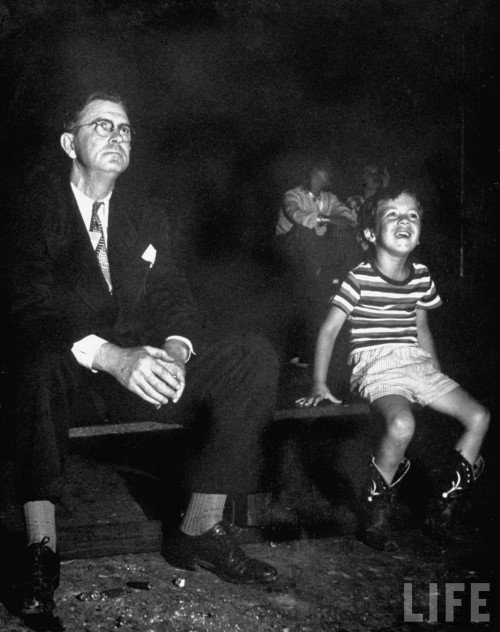I originally found this photo of Erik Lee Kirkland watching his mother, Gypsy Rose Lee, perform while censor is watching performance on alert for over-exposure when creating Gypsy Rose Lee; but find it poignant enough to merit its own post.
Tag: censorship
There Are Flowers In The Attic
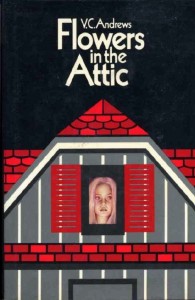 When V.C. Andrews’ Flowers In The Attic was published in 1979, it became all the rage for a teenage girl to read it — and by ‘the rage’ you can presume not only the inclusion of the outrage of those who prefer to censor for all rather than interact with their children as well as the rebellion of teens who wanted to flaunt their right to inflame. And I was one of them.
When V.C. Andrews’ Flowers In The Attic was published in 1979, it became all the rage for a teenage girl to read it — and by ‘the rage’ you can presume not only the inclusion of the outrage of those who prefer to censor for all rather than interact with their children as well as the rebellion of teens who wanted to flaunt their right to inflame. And I was one of them.
I can’t imagine there’s anyone who doesn’t, 30 years later, know the story of the four Dollanganger children locked in an attic. But if you don’t…
A) you can find reviews via the comments and ‘links to this post’ at The V.C. Andrews Movement / Reading Challenge
and 2) you might want to stop reading this post now — because while I’m not going give a classic book review, I will be discussing the reading of this book and my reactions to it, which certainly will contain spoilers.
I don’t recall buying the book (I believe my younger sister, ever much-hipper and popular than I, got it and I feasted on her literary leftovers), but in any case, I definitely recall reading Flowers In The Attic as a teen. (It was the paperback version, so that would have been when I was about 16.) In fact, it was an incredibly vivid book, which left its marks (marks — not scars) on me. It haunted me so that I had planned to name my son Cory, after that ill-fated twin, in some sort of sentimental attempt to wipe away the sins or offer retribution via resurrection. But before I would come to that decision I would have to find redemption for myself and my reading habits.
I was horrified reading Flowers In The Attic. I’d read Gothic novels before; I’d read so-called smut before. But nothing disturbed me like this V.C. Andrews novel had — and the rumors that it was based in truth did not help my ambiguity at all.
I was repelled by what I was reading — yet compelled to continue reading it. I couldn’t put it down and walk away from it… Why was I reading this creepy story about a cruelty and performed on children by family members? Especially as I’d elected to neither watch Sybil nor read the book just a few years before simply because it was too horrifying. How was I now reading this book — and sympathizing with incest and rape?! And, heaven help me, I was itching to get the next book in the series. It was scary and confusing and it made me question my own morality.
I could have gone to my parents with my feelings; they were open and easy to talk with, as I’ve described before. But I figured whatever I was going to have to articulate to them, I ought to be able to articulate to myself — and so figure it out for myself from there. And let’s be honest, there was a significant about of shame which kept me from admitting what I was thinking and feeling to anyone else.
So I endeavored to struggle through it on my own.
Eventually I learned that my fascination was simply that of a reader drawn to a compelling story, into the lives and emotions of characters. The creepy and horrifying things were supposed to be creepy and horrifying — I was supposed to cringe and feel crazed for those characters (and despise others). And if I allowed (or was willing to have) the author manipulate and suspend my disbelief into feeling for these characters to the extent that I sympathized (or even romanticized in the Gothic sense) the matters of sibling sex and rape (if not classic violent rape, that scene certainly raises questions of ability to consent), I was not some lewd damaged being caught up in some literary Stockholm syndrome-esque relationship with the author — the very fact that I was bothered enough to be forced to sort through so many shades of grey (and pure evil) proved that. If I was engrossed enough in the characters to want to cheer them on through darkness to some sort of victory and happiness, I was simply human.
By the time the sequel, Petals on the Wind, was released in paperback, I had no qualms about reading it. I would go on, with a clear conscious, to read the entire series (save for the prequel), but I never did name anyone Cory. I got over it.
Being reminded of this book recently, I wondered if it would still have such a powerful effect on me; so I decided to get a copy and read it again.
I titled this post There Are Flowers In The Attic for two reasons. The first one is that in rereading the book, I was again moved. Yes, it’s lighter fiction than I am used to reading (perhaps not young adult reading per se, but light in literary terms), but the dark subject matter still moves. I did spot continuity errors (in two places, Andrews confuses the two twins with one another, which made for bumpy & annoying rereading), but it’s still a solidly creepy, horrific novel.
The second reason the flowers remain in the attic refers to a parenting opportunity.
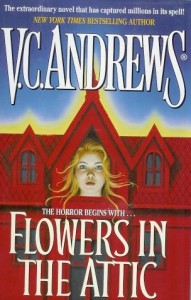 When the 13 year old spotted the ‘scary cover’ of the book, she hinted (she’s forever hinting, not asking) that she’d like to read it. Being that there is a strong sibling effect, I knew the oldest daughter would then want to read what ‘we’ were reading.
When the 13 year old spotted the ‘scary cover’ of the book, she hinted (she’s forever hinting, not asking) that she’d like to read it. Being that there is a strong sibling effect, I knew the oldest daughter would then want to read what ‘we’ were reading.
Both are pretty strong readers, but the eldest, 20, is an Auspie, so she might have additional confusion reading this book, and the 13 year old has abandonment and other issues resulting from her mentally ill, neglectful biological mother. Suffice it to say, I had concerns how either of them would process the book’s subject matter. So I sat them both down to talk about the book and its content.
I told them that I had no problems with either of them reading the book, but that I wanted them to know that the book was scary — and at was at this point that they interrupted me, laughing about how they watch and enjoy scarier movies than I do. Which is true, but, as I explained to them, Flowers In The Attic was far scarier because it wasn’t about vampires, zombies or other fictional monsters; people did the horrible things.
Mothers and grandmothers abused their own children (the girls’ faces fell) — and as a result, the children themselves did things which would, I supposed based on my own reaction to the book, make the girls uncomfortable.
“What things?” they asked.
“There’s some inappropriate sex,” I replied, not wanting to completely spoil the book for them.
There was a pause; no laughing now.
I told them that the book had made me feel creepy and I was ashamed I continued to read it — so much so, that I was too embarrassed to talk to my parents (their benevolent grandparents) about it. So if they wanted to read it, and they felt uncomfortable, they should feel free to quit reading it, talk to someone about how they felt, or both. (This is a general ‘rule’ we teach the kids; but I felt the need to be specific about it with this book.)
The girls looked at each other and then at me, sitting there with my eyebrows arched into question marks. The 13 year old passed on reading it (I suspect it was the ‘sex’ part; she’s quite the prude). The eldest took a look at the book, read the back of it, and said she’d look for more books by the author at the library the next time she was there.
On one hand, I fear I may have not only ruined a potential good read for them but removed their individual opportunity to struggle with their own morality… My intent was not to censor or turn them off of the book.
But on the other hand, I was honest about the book, the subject matter and issues which might arise, and left it to them to decide for themselves what they could handle and/or were interested in reading; and that, in my opinion, is what parents should do.
Even if I denied them the chance to bloom as readers with this specific book, there will be others — there are always others. I hope our continuing discussions about books, and my respect for them as readers, is simply more seed sowing.
FYI, The Complete V.C. Andrews has a contest to win a copy of the newly released Flowers in the Attic/Petals on the Wind bind-up (two books in one) edition to give away.
My Summer of ’79
At 15, I was straddling the simple romantic fantasies of girlhood by day — and the hormonal induced sweaty-pink-bit-manipulations by night.
By day, I still played with Barbie & her friends. Still playing with Barbies was not something I advertised; I didn’t invite my girlfriends over to play with me. Like my nocturnal activities, this was the solo-play of self-discovery.
Playing with Barbie was like warm comfort food; I understood the rules and romance in playland, even if I didn’t understand the ways of the boys around me who had suddenly started reacting to my well-beyond-just-budding breasts.
But at night, I got hot and sweaty for Andy Gibb — via his posters on my walls.
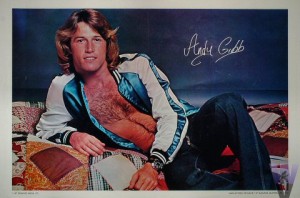 Especially that poster of Andy with his dark blue satin baseball jacket worn open to expose what I could only then (and now) best describe as a tree of hair — with a trunk that went down past the navel to what I could only then bear to imagine as another system of hair at the root… Leading to that something that beefed-up his tight satin pants. And that magnificent mane of hair on his head, ahhh... it still works.
Especially that poster of Andy with his dark blue satin baseball jacket worn open to expose what I could only then (and now) best describe as a tree of hair — with a trunk that went down past the navel to what I could only then bear to imagine as another system of hair at the root… Leading to that something that beefed-up his tight satin pants. And that magnificent mane of hair on his head, ahhh... it still works.
But before I begin to get lost in teenage masturbation fantasies, let’s just say that solo-play was far more productive in terms of my nighttime studies; learning the ins-and-outs of myself, physically & emotionally, was easier than figuring out interpersonal play by myself. But I did learn much about me.
At 15, I knew the score — or at least what scoring was — even if I wasn’t ready for it. At least not with a boy. If I was going to give in — and I wasn’t sure I was — it would be with a man who knew what he was doing.
Since I was an avid reader, Barbie wasn’t my only form of entertainment. (Nor was masturbation — quit trying to get me off the subject!) As an avid reader with a voracious appetite for books, my parents let me read freely from anything on the bookshelves at home and at the library. I hadn’t needed my parents’ permission for any reading material since what, I was 6, 7? I read what I wanted, and asked questions when I needed to.
For example, when I was about 10 I read a mystery book which presented a mystery it hadn’t intended. I forget the title and author, but the passage went like this: “and then he threw the flaming faggot into the fire.” Since the only definition for ‘faggot’ I knew was the same for ‘gay’ and ‘queer’ (hey folks, it was 1974, and folks were ‘out’ in theory even if I didn’t know anyone personally); I was at a loss. How could a man who was alone throw another man into a fire? And if there was someone around, why hadn’t he been mentioned earlier? Shouldn’t there have been some sort of exchange or motive? Was it just bad writing?
Book in hand, I approached my mother, showed her the passage and asked for help. How she kept a straight face (no pun intended) while explaining that ‘faggot’ was an English word for cigarette, I’ll never know… But I do know that not only had she helped me with my vocabulary but I helped her by letting her know what I knew. That’s what parenting is all about, yes?
So, flash forward five years to me at 15 again. I dragged myself away from Andy Gibb’s gaze, left Babs alone (that’s not a euphemism; I refer again to the classic fashion doll), and look for a book on my parents’ book shelf.
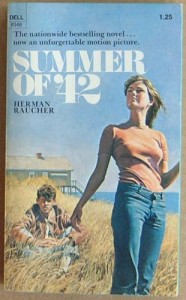 A title caught my eye, The Summer of ’42 — something about it was familiar. I remembered vaguely the book making news… Something about sex & banning the book… Hmm, I thought, I hope it’s not as dumb as Catcher in the Rye. (That book did nothing for me, sorry.) But curiosity won, and I took Summer of ’42 to my room and read it.
A title caught my eye, The Summer of ’42 — something about it was familiar. I remembered vaguely the book making news… Something about sex & banning the book… Hmm, I thought, I hope it’s not as dumb as Catcher in the Rye. (That book did nothing for me, sorry.) But curiosity won, and I took Summer of ’42 to my room and read it.
The book was well-written, but it was from the point of view of a boy, which I found faintly disinteresting. A group of boys who want to get laid, gee, that was news to a 15 year old girl with big boobs. But I hung with it (to date, I’ve only quit reading 3 books — I’m a girl who believes in commitment), and I learned a few things.
Like Hermie’s date with Aggie. Hermie thinks he’s getting lucky by touching her breast — a deformed breast lacking any nipple — only to discover later that he’d been fondling and groping her shoulder. (Hey, Andy Gibb would never, ever, have made that mistake!) This only confirmed my belief that boys were stupid. They were in such a rush, they missed pretty basic stuff. Idiots.
But at the end of the book, the cumulative lessons learned left me once again surprised: I’d read another banned book that left me wondering why it would need to be banned. Frankly, I still am.
Sure, Hermie (an under-age boy) has sex with an older (adult) woman; but it’s depressing. It’s not erotic. Nor is it abusive or crude. In fact, it scared me about my fantasies about Mr. Gibb. I mean Hermie was in love, head over heels in love — ga-ga — and after what he thinks is such a beautiful moment, this woman cries and leaves him. Sure, she was vulnerable with her husband’s death and all, but clearly, she didn’t want some kid. Ouch. And hey, Hermie’s got feelings! Who knew boys had feelings?
This was not some sex-filled-romp of adolescence. This was not some titillating erotic entertainment piece. This was heartbreaking. Even at 15, a never-been-kissed-by-a-boy girl, I recognized the agony of misplaced virginity. I knew that a first time, a first love, a first f***, was sacred. This wasn’t some fodder for a solo-f***-fest, some sensationalized erotic entertainment — far from it. It was a warning. Not only were young boys not practiced enough to find a boob, but they were immature enough to not know they should protect their hearts. While I felt that I would fare better in the groping department, I knew I was likely as lame in matters of the heart.
Not long after, Barbie was put away and didn’t see sunlight until we had a garage sale. I had mastered what I needed to know: romance was a fickle bitch, boys could indeed be hurt too, and romance could be as plastic — as one-sided — as a fashion doll.
I still masturbated to images of Andy, but I no longer romanticized meeting him after a concert and that he’d fall in love with me. It was just sex — just sex in my mind. And it was safer for me at that time to leave it at that. Too bad Hermie hadn’t been that self aware, hadn’t protected himself… And no wonder the older woman who should have known better, but was so affected by her own broken heart she couldn’t think straight, left town asap.
I grew up quite a bit reading Summer of ’42, and I likely saved myself some pain. I’m not saying I mad no mistakes; my life is a character-building exercise. But I made less mistakes, less painful ones. I have Herman Raucher to thank for that. And my parents — for they let me read.
Just last week I asked my mom if she knew that I had read Summer of ’42; yes, she had. I asked her if she was, well, creeped out by it. Her reply? “No. You always came to us if you had questions. …It was a sad story, wasn’t it?”
Yeah mom, it was sad. Sadder still to know that some kids weren’t allowed to read it. Thank you, mom and dad, for being good parents.
 Epilogue: Some kids and adults are still not allowed to read or view Summer of ’42 because it has been banned from their libraries. Or they’ve been told to avoid such ‘horrible’ works. I can’t speak for the film, but if you get a chance, read Summer of ’42. It might be too late to save yourself from past mistakes, but it’s never too late to learn something.
Epilogue: Some kids and adults are still not allowed to read or view Summer of ’42 because it has been banned from their libraries. Or they’ve been told to avoid such ‘horrible’ works. I can’t speak for the film, but if you get a chance, read Summer of ’42. It might be too late to save yourself from past mistakes, but it’s never too late to learn something.
Read it this week, Banned Books Week, buy Banned Books Week merch, blog about it and read what others have to say — and celebrate your freedom to read.
Add Your Voice to NOW’s Call for Open Internet
Add Your Voice to NOW’s Call for Open Internet
|
Support the Internet Freedom Preservation Act! After taking action, please support our work. |
The Internet has allowed NOW to connect like never before with members and allies, potential supporters, students and educators, government leaders and countless others who can help advance equality for all.
The Internet offers a platform for dialogue amongst feminists who might not otherwise have a chance to strategize together. It empowers women by providing them with information about their status, threats to their rights and opportunities for advancement. It presents a tool for democratic participation by allowing women’s rights advocates to easily petition their elected officials and keep tabs on their records.
Without a doubt, the women’s rights movement benefits immensely from the unprecedented power of an open and accessible Internet. But, can we rely on the big companies that bring us the Internet to preserve its open nature? The simple truth is: No, we can’t.
Write to your Congress members today, and urge them to support the Internet Freedom Preservation Act of 2009 (H.R. 3458). This bill will make “Net Neutrality” — one of the guiding principles behind the open Internet — the law of the land. Take action NOW.
Every day, the Internet becomes more and more central to the way we communicate and access media content here in the United States and around the world. The big companies that deliver the Internet to us — like AT&T, Comcast and Verizon — stand to gain an enormous amount of revenue in the coming years, and they are looking for even more ways to pocket big bucks.
How exactly would they do that? By charging fees that would allow some websites and content to download via an exclusive fast lane, while those that can’t afford these fees are relegated to the slow lane. Some websites and applications would be blocked altogether, as the phone and cable companies decide which content and tools they want to offer us.
In fact, this is already happening. AT&T censored streaming video from a Pearl Jam concert. Comcast has blocked Internet software, and Verizon prevented a reproductive rights group from sending text messages to people who had requested them. Clearly, public policy is needed to ensure that the big companies can not discriminate on the web by censoring and blocking information we need to advance the issues we care about.
The beauty of the Internet, and its great innovation over conventional, mainstream media, is that it is open to everyone. An unlimited amount of information is available at everyone’s fingertips when they access the web. Similarly, we can add our own content and voices to the web in a way that is not possible with radio, television and other traditional media.
But hundreds of lobbyists on Capitol Hill, employed by the telecommunications giants, are trying to change all that. Organizations like NOW could find their online efforts seriously impaired by this move to partition off (dare we say segregate?) the Internet.
Net Neutrality must become law to ensure that the Internet remains open to innovation, democratic participation, and a free exchange of ideas. The Internet Freedom Preservation Act is designed to ensure that this dynamic medium remains free from discrimination.
Don’t let big business turn the Internet into another version of cable TV. This is OUR Internet, and we can save it.
| and then |
